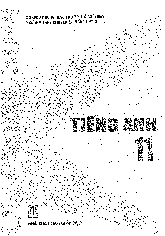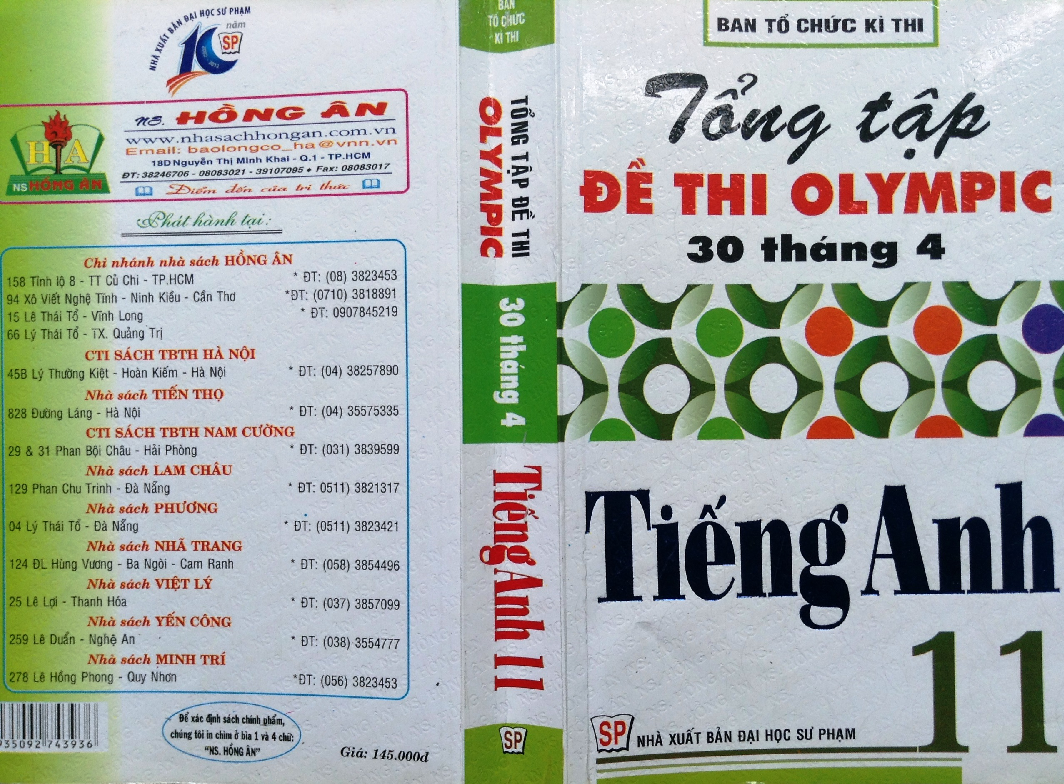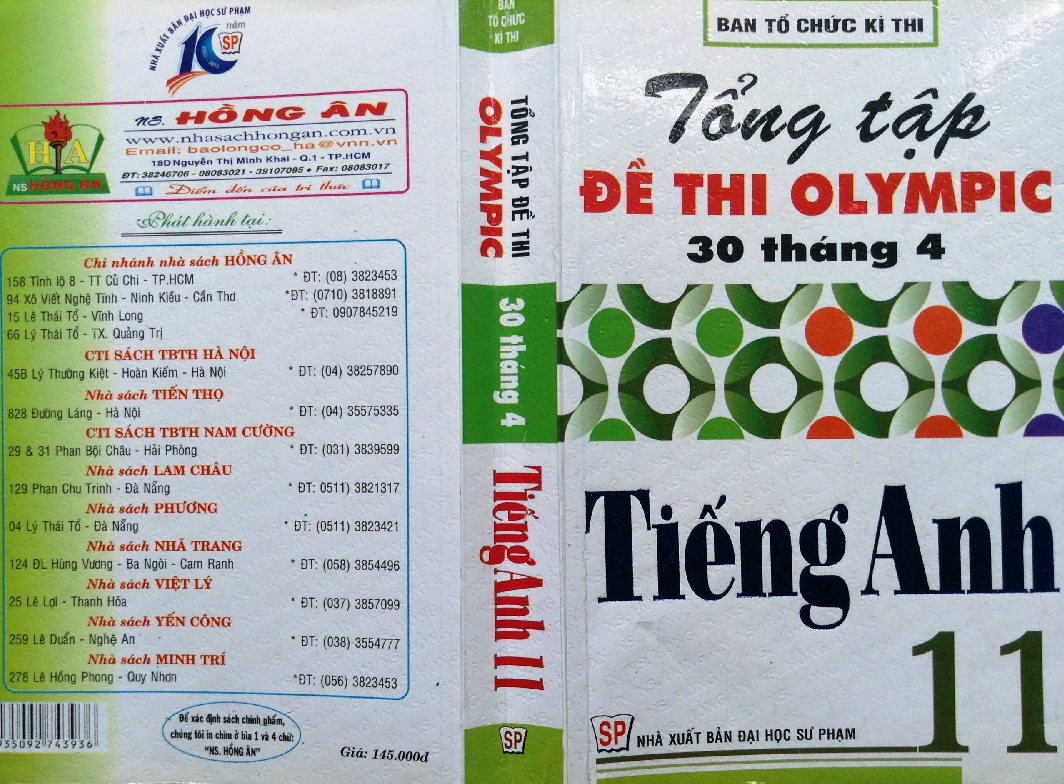









Preview text:
SỞ GIÁO DỤC VÀ ĐÀO TẠO TỈNH ĐẮK LẮK
TRƯỜNG THPT TRẦN ĐẠI NGHĨA
KỲ THI OLYMPIC 10-3 LẦN THỨ III
ĐỀ THI ĐỀ NGHỊ MÔN: TIẾNG ANH - LỚP: 11 1 ĐỀ THI VÀ ĐÁP ÁN PHẦN TRẮC NGHIỆM
I. Choose the word whose underlined part pronounced differently from the rest. (2.5pts) 1. A. rhinoceros B. vehicle C. whale D. uninhabitable 2. A. gait B. lair C. fair D. dairy 3. A. mosaic B. conserve C. reserve D. poison 4. A. canal B. casino C. canary D. canon 5. A. manufacture B. mature C. pasture D. nature ANSWERS: 1. D. uninhabitable 2. A. gait 3. B. conserve 4. D. canon 5. B. mature
II. Choose one word whose stress pattern is different from the rest. (2.5pts) 1. A. technical B. introduce C. villager D. family 2. A. forest B. compose C. fauna D. audience 3. A. technology B. important C. popularity D. impossible 4. A. instrument B. counterpart C. organism D. musician 5. A. alternative B. agriculture C. magnificent D. photography ANSWERS: 1. B. announce 2. B. introduce 3. C. popularity 4. D. musician 5. B. agriculture
III. Choose the best answer to complete each sentence below. (5pts)
1. Many people still haven’t
how dangerous pollution can be. A. remarked B. noted C. realised D. discovered
2. Could you close the window? There is a bit of a _____. A. current B. wind C. draught D. breeze
3. Thousands of steel _____ were used as the framework of the new office block. A. beams B. girders C. stakes D. piles 4. The shop assistant was
helpful, but she felt he could have given her more advice. A. entirely B. quite C. totally D. mostly
5. He set one alarm-clock for five o’clock and the other for five past so as to _____ that he did not oversleep. A. assure B. ensure C. insure D. reassure
6. A healthy body will be able to fight off the illness without the use of medicine. A. mysteriously B. endlessly C. magically D. naturally
7. His answer was so confused that I could hardly make any of it at all. A. interpretation B. meaning C. intelligibility D. sense
8. He has been unable to find a job
with his ability as an accountant. A. appropriate B. suitable C. commensurate D. requisite
9. Their eventual choice of house was _____ by the time Peter would take to get to the office. A. related B. consequent C. determined D. dependent
10. She loved tennis and could watch it till the _____ came home. A. she B. everyone C. horses D. cows ANSWERS: 1. C. realised 2. C. draught 3. B. girders 4. B. quite 5. B. ensure 6. D. naturally 7. D. sense
8. C. commensurate 9. C. determined 10. D. cows
IV. Choose the best answer to complete each sentence below. (5pts) 1. If you live in
foreign country, you should try and learn language. 2 A. the/ a B. a/ the C. the/ the D. a/ a
2. It was only ________ he told me his surname that I realised that we had been to the same school . A. then B. until C. as soon as D. when
3. I _______ a meeting at the office at this time tomorrow, so you can phone me later in the evening. A. will have B. have had C. will have had D. will be having
4. She denied the accusation _______ true. She felt innocent. A. to be B. being C. to being D. of being
5. Without the traffic jam on the high way this morning, I _______ late for the meeting. A. would be B. would have been C. hadn't been D. wouldn't have been 6.
, he was determined to continue to climb up the mountain. A. However tired B. Tired as he might feel C. As he might feel tired D. He felt very tired though 7. Jason’s professor had him
his thesis many times before allowing him to present it to the committee. A. rewrites B. rewriting C. rewrite D. to rewrite 8. The problems
last year caused to the committee members to table the proposal temporarily. A. were discovered B. that discovered C. discovering D. discovered
9. You have cut the material in the wrong place. It ought ______ just here but it was not. A. to have been cut B. to be cut C. to have cut D. to cut
10. I am _______ my brother is. A. nowhere like ambitious as
B. nothing near as ambitious as C. nothing as ambitious
D. nowhere near as ambitious as ANSWERS: 1. B. a/ the 2. D. when 3. D. will be having 4. A. to be 5. D. wouldn't have been 6. B. Tired as 7. C. rewrite 8. D. discovered
9. A. to have been 10. D. nowhere he might feel cut near as ambitious as
V. Choose the best answer to complete each sentence below. (5pts) 1. I ran
milk yesterday. Please have some tea instead. A. into B. away C. across D. out of
2. Everybody was upset when the old lady ……………, she used to be a very nice woman. A. pass by B. passed by C. pass away D. passed away
3. I didn’t think he’d win the race but he was brought ………….. . A. off B. about C. about D. up
4. As soon as I opened the garden gate, the dog came us with teeth bared. A. across B. at C. by D. out
5. After the flash flood, all the drains were overflowing storm water. A. from B. by C. with D. to
6. The thought of living in another country has never ______ my mind. A. crossed B. entered C. occurred to D. come
7. I was passing their house, so I ______ Claire and Michael. A. dropped in B. came up with C. got on with D. run into
8. I won’t ………….. these excuses any longer! I demand to see the manager. A. put up with B. put off again C. put up for D. put off with
9. Her mother’s illness cast a cloud her wedding day. A. in B. for C. over D. on
10. Having decided to rent a flat, we
contacting all the accommodation agencies in the city. A. set off B. set about C. set out D. set to 3 ANSWERS: 1. D. out of
2. D. passed away 3. A. off 4. B. at 5. C. with 6. A. crossed 7. A. dropped in
8. A. put up with 9. C. over 10. B. set about
VI. Read the following passage and answer the questions that follow. (5pts)
The Sun today is a yellow dwarf star. It is fueled by thermonuclear reactions near its center that
convert hydrogen to helium. The Sun has existed in its present state for about four billion six
hundred million years and is thousands of times larger than the Earth. By studying other stars,
astronomers can predict what the rest of the Sun’s life will be like. About five billion years from
now, the core of the Sun will shrink and become hotter. The surface temperature will fall. The higher
temperature of the center will increase the rate of thermonuclear reactions. The outer regions of the
Sun will expand approximately 35 million miles, about the distance to Mercury, which is the closest
planet to the Sun. The Sun will then be a red giant star. Temperatures on the Earth will become too
high for life to exist. Once the Sun has used up its thermonuclear energy as a red giant, it will begin
to shrink. After it shrinks to the size of the Earth, it will become a white dwarf star. The Sun may
throw off huge amounts of gases in violent eruptions called nova explosions as it changes from a red
giant to a white dwarf. After billions of years as a white dwarf, the Sun will have used up all its fuel
and will have lost its heat. Such a star is called a black dwarf. After the Sun has become a black
dwarf, the Earth will be dark and cold. If any atmosphere remains there, it will have frozen over the Earth’s surface.
1. It can be inferred from the passage that the Sun ______.
A. is approximately halfway through its life as a yellow dwarf
B. will continue to be a yellow dwarf for another 10 billion years
C. has been in existence for 10 billion years
D. is rapidly changing in size and brightness
2. What will probably be the first stage of change for the Sun to become a red giant?
A. Its surface will become hotter and shrink.
B. It will throw off huge amounts of gases.
C. Its central part will grow smaller and hotter.
D. Its core will cool off and use less fuel.
3. When the Sun becomes a red giant, what will the atmosphere be like on the Earth?
A. It will be enveloped in the expanding surface of the sun.
B. It will become too hot for life to exist.
C. It will be almost destroyed by nova explosions.
D. It will freeze and become solid.
4. When the Sun has used up its energy as a red giant, it will ______. A. get frozen B. cease to exist C. stop to expand D. become smaller
5. Large amounts of gases may be released from the Sun at the end of its life as a ______. A. black dwarf B. white dwarf C. red giant D. yellow dwarf
6. As a white dwarf, the Sun will be ______.
A. the same size as the planet Mercury
B. around 35 million miles in diameter C. a cool and habitable planet
D. thousands of times smaller than it is today
7. The Sun will become a black dwarf when ______.
A. the Sun moves nearer to the Earth
B. it has used up all its fuel as a white dwarf
C. the core of the Sun becomes hotter
D. the outer regions of the Sun expand
8. The word “there” in the last sentence of paragraph 4 refers to ______. A. the planet Mercury B. the core of a black dwarf C. our own planet
D. the outer surface of the Sun
9. This passage is intended to ______.
A. describe the changes that the Sun will go through
B. present a theory about red giant stars
C. alert people to the dangers posed by the Sun
D. discuss conditions on the Earth in the far future
10. The passage has probably been taken from ______. A. a scientific journal B. a news report 4 C. a work of science fiction D. a scientific chronicle ANSWERS : 1 2 3 4 5 6 7 8 9 10 A C B D C D B C A A
VII. Read the following passage and choose the best option to complete the blank or answer the question. (5pts)
Legend has it that sometime toward the end of the Civil War (1861-1865) a government train
carrying oxen traveling through the northern plains of eastern Wyoming was caught in a snowstorm
and had to be abandoned. The driver returned the next spring to see what had become of his cargo.
Instead of the skeletons he had expected to find, he saw his oxen living, fat, and healthy. How had they survived?
The answer lay in a resource that unknowing Americans lands trampled underfoot in their haste
to cross the “Great American Desert” to reach lands that sometimes proved barren. In the eastern
parts of the United States, the preferred grass for forage was a cultivated plant. It grew well with
enough rain, then when cut and stored it would cure and become nourishing hay for winter feed. But
in the dry grazing lands of the West that familiar blue joint grass was often killed by drought. To
raise cattle out there seemed risky or even hopeless.
Who could imagine a fairy-tale grass that required no rain and somehow made it possible for
cattle to feed themselves all winter? But the surprising western wild grasses did just that. They had
wonderfully convenient features that made them superior to the cultivated eastern grasses. Variously
known as buffalo grass, grama grass, or mesquite grass, not only were they immune to drought; but
they were actually preserved by the lack of summer and autumn rains. They were not juicy like the
cultivated eastern grasses, but had short, hard stems. And they did not need to be cured in a barn, but
dried right where they grew on the ground. When they dried in this way, they remained naturally
sweet and nourishing through the winter. Cattle left outdoors to fend for themselves thrived on this
hay. And the cattle themselves helped plant the fresh grass year after year for they trampled the
natural seeds firmly into the soil to be watered by the melting snows of winter and the occasional
rains of spring. The dry summer air cured them much as storing in a barn cured the cultivated grasses.
1. What does the passage mainly discuss? A. A type of wild vegetation
B. Western migration after Civil War C. The raising of cattle
D. The climate of the Western United States
2. What can be inferred by the phrase “Legend has it” in line 1?
A. Most history book include the story of the train.
B. The story of the train is similar to other ones from that time period.
C. The driver of the train invented the story.
D. The story of the train may not be completed factual.
3. The word “they” in line 5 refers to _____. A. plains B. skeletons C. oxen D. Americans
4. What can be inferred about the “Great American Desert” mentioned in line 7?
A. Many had settled there by the 1860’s.
B. It was not originally assumed to be a fertile area.
C. It was a popular place to raise cattle before the Civil War.
D. It was not discovered until the late 1800’s.
5. The word “barren” in line 8 is closed in meaning to _____. A. lonely B. uncomfortable C. infertile D. dangerous
6. The word “preferred” in line 8 is closed in meaning to _____. A. favored B. available C. ordinary D. required
7. Which of the following can be inferred about the cultivated grass mentioned in the second paragraph? 5
A. Cattle raised in the Western United States refused to eat it.
B. It had to be imported into the United States.
C. It would probably not grow in the western United States.
D. It was difficult for cattle to digest.
8. Which of the following was NOT one of the names given to the western grasses? A. Mesquite grass B. Blue joint grass C. Buffalo grass D. Grama grass
9. Which of the following was NOT mentioned as a characteristic of western grasses?
A. They contain little moisture B. They have tough stems C. They can be grown indoors
D. They are not affected by dry weather
10. According to the passage, the cattle help promote the growth of the wild grass by_____.
A. eating only small quantities of grass
B. continually moving from one grazing area to another
C. naturally fertilizing the soil
D. stepping on and pressing the seeds into the ground ANSWERS: 1 2 3 4 5 6 7 8 9 10 A B C D C A C B D B
VIII. Choose the best answer from the four options to complete each of the numbered blanks
in the following passage. (5pts)
Everyone needs somewhere to live and work, and humans will construct buildings almost
(1)_______, using even ice or mud as materials if nothing else is available. In the industrialized
world, the problem is not finding materials for building but limited space and the high price of land.
The solution in most big cities is to build skyscrapers high (2) _______ the air but is there an
alternative to building up? Some architects have proposed turning skyscrapers on their heads and
building down into the (3) _______. This may seem an unusual concept but extensive railway
systems exist underground so why not huge cities? Such places could accommodate 100,000 people
without using up (4) _______ surface land. The underground city is technically feasible but there is a
massive psychological (5) _______ to be overcome. Will people be able to (6) _______ with living
away from the sun and sky? The underground “city” could be restricted to places of entertainment
and office buildings but even being buried just for your working hours may not seem (7) _______.
Some such buildings do exist. In Minneapolis, USA, there is a building which is 95 per cent
underground but even the lowest floors get some sunlight. This is achieved by an elaborate system of
mirrors. Living underground means you do not know (8) _______ the weather is like but architects
(9) _______ great efforts to mimic conditions above ground. For example, the Asahi television
centre in Tokyo is 20 meters below the surface but a special shower system can create the
(10)_______ of rain. It seems that subterranean workers miss real weather even when it is bad! 1. A. somewhere B. nowhere C. anywhere D. wherever 2. A. in B. to C. onto D. into 3. A. ground B. land C. soil D. earth 4. A. valueless B. valuable C. worthy D. worthless 5. A. bar B. barrier C. fence D. border 6. A. do B. solve C. provide D. deal 7. A. attraction B. attractively C. attract D. attractive 8. A. which B. that C. what D. whether 9. A. make B. do C. take D. have 10. A. depression B. impression C. admission D. suggestion ANSWERS: 1 2 3 4 5 6 7 8 9 10 6 C D A B B D D C A B
IX. Read the following passage and circle A, B, C, or D that corresponds to the answer which
best fits each blank space. (5pts)
Throughout history, man has developed (1)
of energy to do his work. Primitive man had
only the strength of his arms and the use of fire. He later (2) how to use the energy of the
wind to move his sailing vessels. He used the energy of water to (3) ______ his mills. He tamed
animals as new sources of energy. They pulled plows and wagons. A new stage in the development
of the use of energy came with the (4)
of steam engine. Steam could be used to develop
energy to run machines. The discovery of electricity created an even more important way of using
energy. So did the invention of gasoline engines. Man entered into a new (5) of the use of
energy with the application of nuclear energy. Man finds many ways to release energy to do work. (6)
, he changes the energy in a waterfall into electricity. He can turn this electrical current
into radio waves that can carry his ideas for thousands of miles. He can release the energy in
gasoline by burning it and using it to (7) automobiles. He can (8) use of
coal to turn water into steam and in return use the steam to (9) electrical energy. The
nucleus of certain atoms can produce millions of times more energy per pound of material than can be made (10) by chemical means. 1. A. sources B. resources C. invention D. use 2. A. found B. showed C. discovered D. distinguished 3. A. turn B. take C. cycle D. move 4. A. finding B. production C. construction D. invention 5. A. time B. era C. history D. step 6. A. For Example B. However C. As a result D. Nevertheless 7. A. equip B. provide C. feed D. power 8. A. make B. get C. take D. learn 9. A. generate B. invent C. supply D. bring 10. A. usable B. available C. possible D. capable ANSWERS: 1 2 3 4 5 6 7 8 9 10 A C A D B A D A A B PHẦN TỰ LUẬN
I. Fill in each numbered blank with ONE suitable word. ( 10 pts)
Conservation, sustainable use and protection of natural resources including plants, animals,
mineral deposits, soils, clean water, clean air, and fossil fuels (1) _______ as coal, petroleum, and
natural gas. (2)_______ resources are grouped into two categories, renewable and (3) _______. A
renewable resource is one that may be replaced over time by natural processes, such as fish
populations or natural vegetation, or is inexhaustible, such as solar energy. The goal of renewable
resource conservation is to ensure (4) _______ such resources are not consumed faster (5) _______
they are replaced. Nonrenewable resources are those in limited supply that cannot be replaced (6)
_______ can be replaced only over extremely long periods of time. Nonrenewable resources (7)
_______ fossil fuels and mineral deposits, such as iron ore and gold ore. Conservation activities for
nonrenewable resources focus (8) _______ maintaining an adequate supply of these resources well
into the future. Natural resources are conserved for their biological, economic, and recreational
values, as well as their natural beauty and importance to local cultures. For (9) _______, tropical rain
forests are protected for their important role in both global ecology (10) _______ the economic
livelihood of the local culture; a coral reef may be protected for its recreational value for scuba
divers; and a scenic river may be protected for its natural beauty... 7 ANSWERS: 1. such 2. natural 3. nonrenewable 4. that 5. than 6. or 7. include 8. on 9. examples 10. and
II. Fill in each numbered blank with ONE suitable word. ( 10 pts) Environmental Concerns
Earth is the only place we know of in the universe that can support human life; (1)………….,
human activities are making the planet less fit to live on. As the western world carries on consuming
two-thirds of the world's resources while half of the world's population do so (2) …………. to stay
alive we are rapidly destroying the resource we have by (3) ………….all people can survive and
prosper. Everywhere fertile soil is (4) …………. built on or washed into the sea. Renewable
resources are exploited so much that they will never be able to recover (5) …………. We discharge
pollutants into the atmosphere without any thought of the consequences. As a (6) …………., the
planet's ability to support people is being reduced at the very time when rising human numbers and
consumption are (7) ………….increasingly heavy demands on it.
The Earth's (8) …………. resources are there for us to use. We need food, water, air, energy,
medicines, warmth, shelter and minerals to (9) …………. us fed, comfortable, healthy and active. If
we are sensible in how we use the resources they will (10) …………. indefinitely. But if we use
them wastefully and excessively they will soon run out. ANSWERS: 1. yet/ however 2. just 3. which 4. either 5. completely 6. result 7. making 8. natural 9. keep 10. last
III. Write the correct form of each bracketed word in the numbered space provided in the
column on the right. (0) has been done as an example. (10pts)
0. These shoes look quite smart but they’re terribly UNCOMFORTABLE. (COMFORT)
1. I’ll never forget the _________ I felt in the situation. (HUMILIATE)
2. She’s so ________ that she won’t let anything stand in the way of her ambition. (MIND)
3. 10. This matter is very ______________. Don’t discuss it outside the office. (CONFIDENCE)
4. It’s ______ of him to lose his temper like that – he’s usually very calm. (CHARACTER)
5. Many diseases which were once thought _______________ now can be routinely treated. (CURE)
6. 8. Film studios spend millions of dollars on ______________for new movies. (PUBLIC)
7. Teachers must keep a record of students’_____________________ (ATTEND)
8. Our school set up a project to _________________ the library system. (COMPUTER)
9. The breakdown of the negotiations was not_______________. (EXPECT)
10. 9. The trouble with Mr. Brown is that he’s so ______________. One minute he goes mad when
you come late then he says nothing. You never know where you are! (CONSIST) ANSWERS: 1. humiliation 2. single-minded/ 3. confidential 4. uncharacteristic 5. incurable strong-minded 6. publicity 7. attendances 8. computerize 9. unexpected 10. inconsistent
IV. Fill each blank with the right form of ONE suitable word from the box. (10pts) 8 injury weight one differ climb organization house high mountain difficulty
THE FIRST WOMAN ON MOUNT EVEREST Mount Everest is the (1)
in the world. It is in the Himalayan Mountains between
Nepal and China, and it is 8,900 meters high. Sir Edmund Hillary from New Zealand and Tensing
Norway from Nepal were the first people ever to climb Mount Everest. They climbed it in 1953. Men from several (2)
countries climbed it after that.
Junko Tabei, a Japanese, from Hokkaido, was the first woman to make this (3) climb.
A Tokyo newspaper-television company (4)
the climb in 1975. They chose fifteen women from (5)
clubs to go to Nepal. The group climbed for several days. Then
there was an avalanche. The heavy ice and snow (6)
ten of the women. They had to stop
climbing. The other five continued.
Only Ms. Tabei was able to climb the last 70 meters. She was standing on top of the world. She was the (7) woman there.
Ms. Tabei was 35 years old at the time. She is one meter 50 centimeters tall and (8) 42
kilograms. She says that she is an ordinary (9)
. She started climbing mountains in
1960. She climbed every mountain in Japan. Then she climbed Amapurna, another high mountain in
the Himalayas. Finally, she climbed the world’s highest mountain.
When she reached the top, she thought “I’m at the top and I’m glad that I’m at the top.” Then she
climbed back down the mountain. She is one of the greatest mountain (10) in the world. ANSWERS: 1. highest 2. different 3. difficult 4. organized 5. mountaineering 6. injured 7. first 8. weighs 9. housewife 10. climbers
V. Find and correct TEN errors in the following passage. (10pts)
Air pollution is a cause for ill – health in human beings. In a lot of 0. for => of
countries, there are laws limited the amount of smoke which factories can 1. _________
produce. Because there isn't enough information on the amount of smoke in 2. _________
the atmosphere, doctors have proved that air pollution makes lung cancer. 3. _________
The gases from the exhausts of cars have also risen air pollution in most 4. _________
cities. The lead in petrol produces a poisoned gas which often collects in 5. _________
busy streets surrounding by high buildings. Children who live in areas 6. _________
where there is a lot of lead in the atmosphere cannot think as quick as other 7. _________
children and they are clumsy where they use their hands. There are 8. _________
long-term effects of pollution. If the gases in the atmosphere continues to 9. _________
increase, the earth's climate will become warmer. A lot of ice near the Poles 10. ________
may water and may cause serious floods. ANSWERS: 1. limited => limiting
6. surrounding => surrounded 2. Because => Although 7. quick => quickly 3. makes => causes 8. where=> when 4. risen => increased 9. continues => continue 5. poisoned => poisonous 10. water => melt 9
VI. Finish each of the following sentences in such a way that it is as similar as possible in
meaning to the original sentence. Start with the word(s) provided. (20pts)
1. The phone stopped ringing the moment I got down stairs. No sooner
………………………………………….
2. Jack completed his essay in two hours. It took
…………………………………………………..
3. He was very sorry that he didn’t see Audrey on her trip to London. He greatly
…………………………………………
4. She agreed to go out to dinner with him because she assumed he was not married. → Had she
……………………………………………………………
5. The best solution was always thought of by Mary. Mary always came
……………………………………………………….
6. Teaching doesn’t really suit her. She isn’t really cut
………………………………………………………
7. Tom has always a good relationship with his classmates. Tom has always got
………………………………………………………
8. Barbara was shocked to hear that she had failed his driving test. It came ………………………
9. John didn’t listen to what his doctor told him. John took
……………………………………………………………………………….
10. He is different from his brother in almost all aspects. He bears ANSWERS:
1. No sooner had I got downstairs than the phone stopped ringing.
2. It took Jack two hours to complete his essay.
3. He greatly regretted not seeing Audrey on her trip to London.
4. Had she known that he was married, she would not have agreed to go out to dinner with him.
5. Mary always came up with the best solution.
6. She isn’t really cut out for being a teacher./She isn’t really cut out to be a teacher.
7. Tom has always got on/along well with his classmates.
8. It came as a great surprise to Barbara that she had failed his driving test.
9. John took no notice of his doctor’s advice.
10. He bears little/ hardly any resemblance to his brother. --- THE END --- 10




